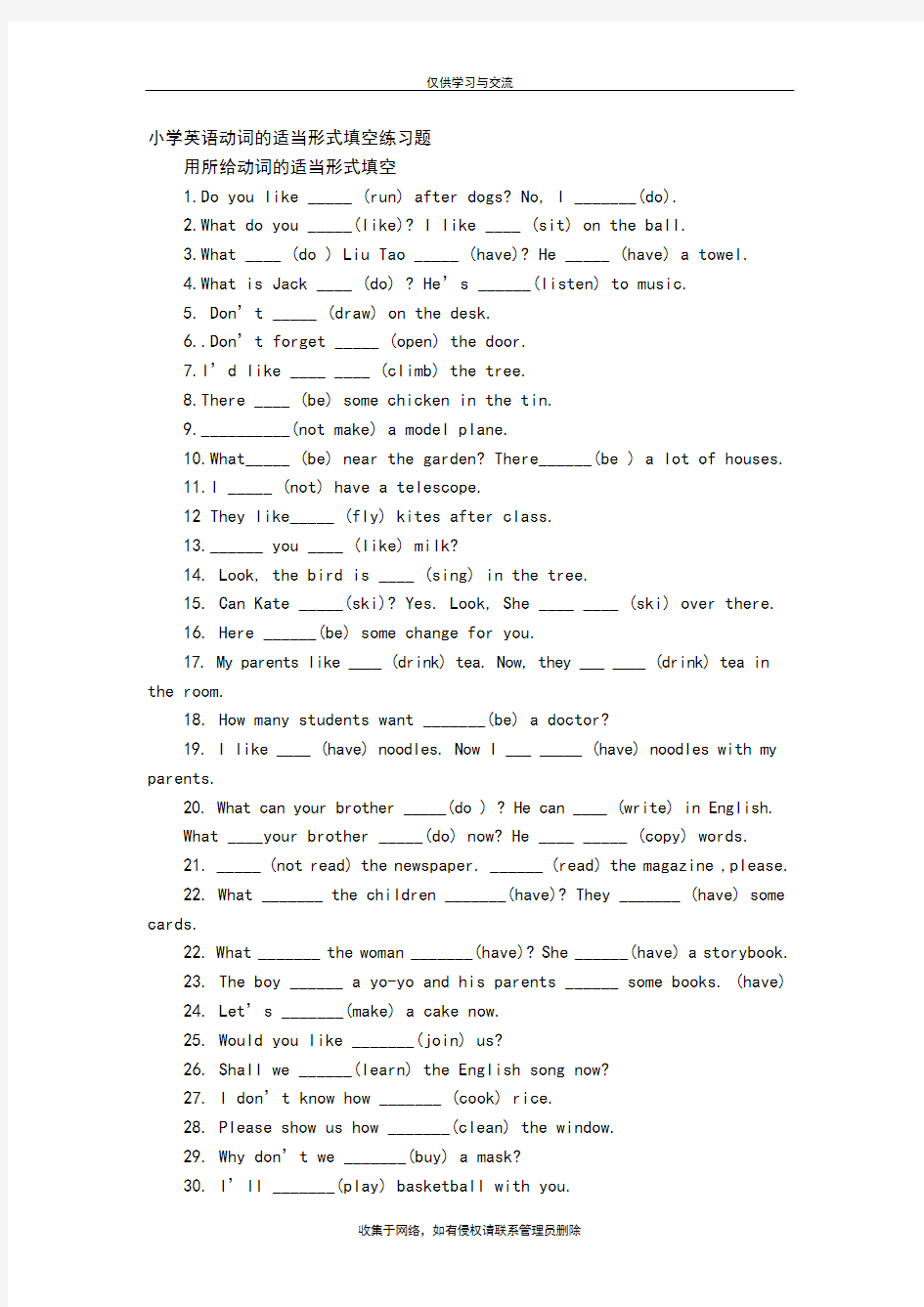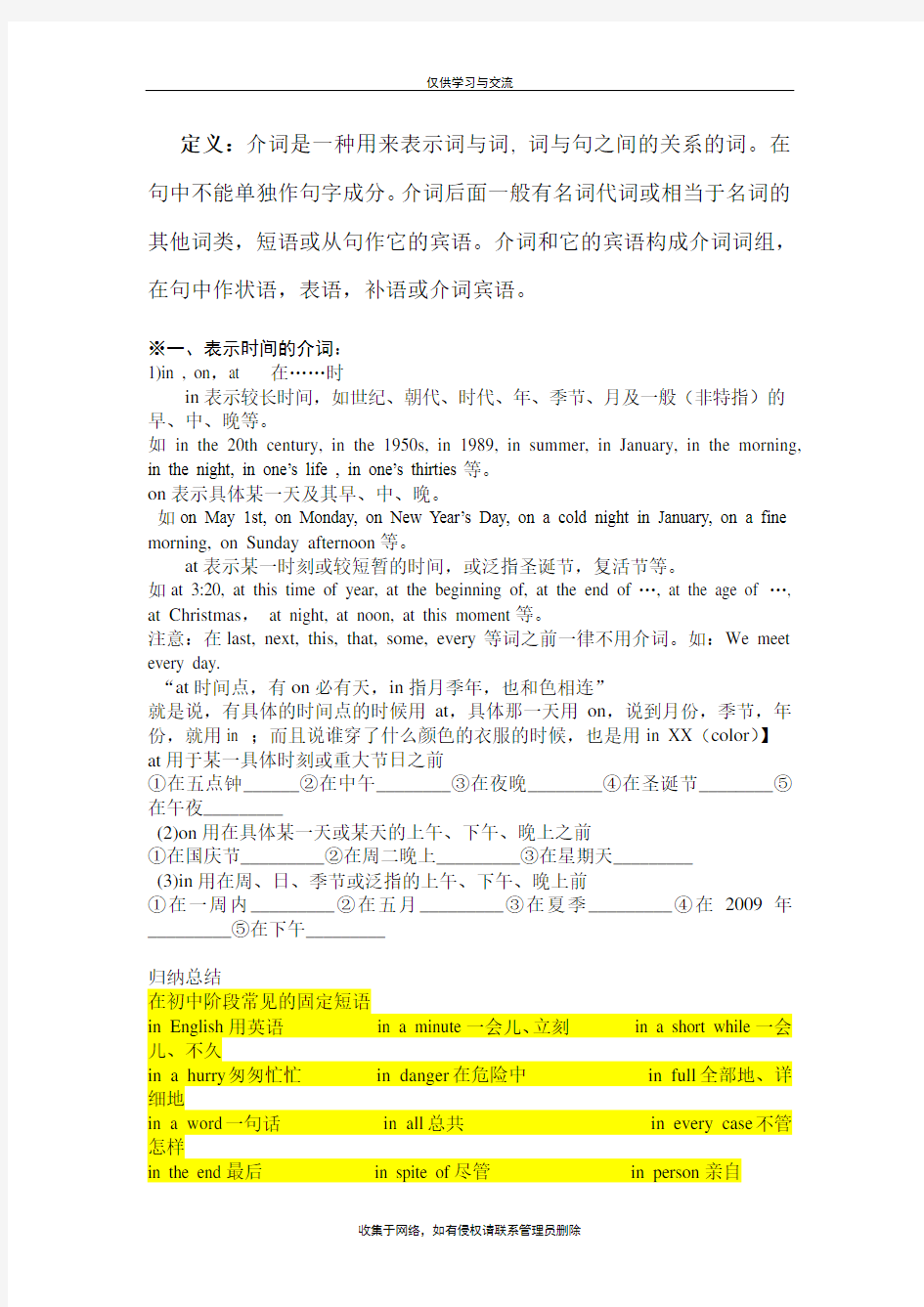最新小学英语动词的适当形式填空练习题


小学英语动词的适当形式填空练习题
用所给动词的适当形式填空
1.Do you like _____ (run) after dogs? No, I _______(do).
2.What do you _____(like)? I like ____ (sit) on the ball.
3.What ____ (do ) Liu Tao _____ (have)? He _____ (have) a towel.
4.What is Jack ____ (do) ? He’s ______(listen) to music.
5. Don’t _____ (draw) on the desk.
6..Don’t forget _____ (open) the door.
7.I’d like ____ ____ (climb) the tree.
8.There ____ (be) some chicken in the tin.
9.__________(not make) a model plane.
10.What_____ (be) near the garden? There______(be ) a lot of houses.
11.I _____ (not) have a telescope.
12 They like_____ (fly) kites after class.
13.______ you ____ (like) milk?
14. Look, the bird is ____ (sing) in the tree.
15. Can Kate _____(ski)? Yes. Look, She ____ ____ (ski) over there.
16. Here ______(be) some change for you.
17. My parents like ____ (drink) tea. Now, they ___ ____ (drink) tea in the room.
18. How many students want _______(be) a doctor?
19. I like ____ (have) noodles. Now I ___ _____ (have) noodles with my parents.
20. What can your brother _____(do ) ? He can ____ (write) in English.
What ____your brother _____(do) now? He ____ _____ (copy) words.
21. _____ (not read) the newspaper. ______ (read) the magazine ,please.
22. What _______ the children _______(have)? They _______ (have) some cards.
22. What _______ the woman _______(have)? She ______(have) a storybook.
23. The boy ______ a yo-yo and his parents ______ some books. (have)
24. Let’s _______(make) a cake now.
25. Would you like _______(join) us?
26. Shall we ______(learn) the English song now?
27. I don’t know how _______ (cook) rice.
28. Please show us how _______(clean) the window.
29. Why don’t we _______(buy) a mask?
30. I’ll _______(play) basketball with you.
定义:介词是一种用来表示词与词, 词与句之间的关系的词。在句中不能单独作句字成分。介词后面一般有名词代词或相当于名词的其他词类,短语或从句作它的宾语。介词和它的宾语构成介词词组,在句中作状语,表语,补语或介词宾语。
※一、表示时间的介词:
1)in , on,at 在……时
in表示较长时间,如世纪、朝代、时代、年、季节、月及一般(非特指)的早、中、晚等。
如in the 20th century, in the 1950s, in 1989, in summer, in January, in the morning, in the night, in one’s life , in one’s thirties等。
on表示具体某一天及其早、中、晚。
如on May 1st, on Monday, on New Year’s Day, on a cold night in January, on a fine morning, on Sunday afternoon等。
at表示某一时刻或较短暂的时间,或泛指圣诞节,复活节等。
如at 3:20, at this time of year, at the beginning of, at the end of …, at the age of …, at Christmas,at night, at noon, at this moment等。
注意:在last, next, this, that, some, every 等词之前一律不用介词。如:We meet every day.
“at时间点,有on必有天,in指月季年,也和色相连”
就是说,有具体的时间点的时候用at,具体那一天用on,说到月份,季节,年份,就用in ;而且说谁穿了什么颜色的衣服的时候,也是用in XX(color)】
at用于某一具体时刻或重大节日之前
①在五点钟______②在中午________③在夜晚________④在圣诞节________⑤在午夜_________
(2)on用在具体某一天或某天的上午、下午、晚上之前
①在国庆节_________②在周二晚上_________③在星期天_________
(3)in用在周、日、季节或泛指的上午、下午、晚上前
①在一周内_________②在五月_________③在夏季_________④在2009年_________⑤在下午_________
归纳总结
在初中阶段常见的固定短语
in English用英语in a minute一会儿、立刻in a short while一会儿、不久
in a hurry匆匆忙忙in danger在危险中in full全部地、详细地
in a word一句话in all总共in every case不管怎样
in the end最后in spite of尽管in person亲自
